CONTACT US
Secretariat of UCLG-ASPAC Committee on the Belt and Road Local Cooperation
Floor 18, Building C, Civic Center, 18 East Jiefang Road, Shangcheng District, Hangzhou
secretariat-brlc@hzfao.gov.cn
Zip code: 310026

On the morning of September 5th, which was also the day of the 6th Hangzhou International Day, the 2nd General Assembly and the 2023 Council Meeting of UCLG ASPAC Committee on the Belt and Road Local Cooperation (BRLC) took place, via both online and offline, with the offline gathering in Hangzhou.
Ashok Kumar Byanju Shrestha, President of UCLG ASPAC (United Cities and Local Governments Asia-Pacific) and Mayor of Dhulikhel Municipality, Bernadia Irawati Tjandradewi, Secretary-General of UCLG ASPAC, Maria Moreni, Co-President of BRLC and President of Italy-China Link Association, as well as representatives from Wuhan City, Yiwu City (BRLC Council member city), and the Chairman of the Malaysia-China Friendship Association Sabah (BRLC Council member ), were in attendance. They all delivered speeches during the meeting. Additionally, approximately 80 representatives from member cities and institutions such as Xiamen, Changsha, Fuzhou, and Dujiangyan in China, Oulu City in Finland, Carpenedolo in Italy, Dhankuta in Nepal, the National Association of Rural Municipalities in Nepal (NARMIN), and the Municipal Association of Bangladesh attended the offline meeting in Hangzhou in person. Others participated in the general assembly online.
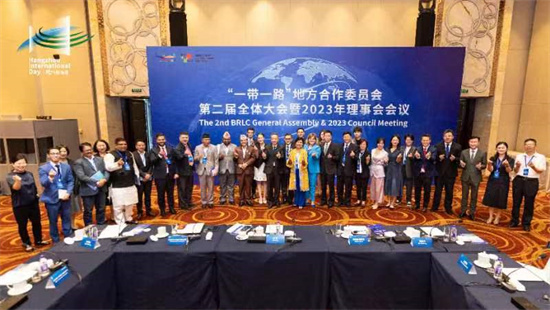
In his opening remarks, President Byanju of UCLG ASPAC expressed his delight at being able to convene in person once again after the challenges posed by the COVID-19 pandemic. He emphasized the importance of using this gathering to initiate new projects, promote mutual benefits and win-win outcomes, and foster broader partnerships.
During the meeting, BRLC Secretariat presented a report on the progress of work from 2018 to 2023 and introduced the upcoming five-year work plan. This year is significant as it marks the tenth anniversary of the Belt and Road Initiative and represents the beginning of a new phase for BRLC. BRLC’s goal is to establish itself as a prominent platform for regional cities to actively participate in the Belt and Road Initiative. Building on the support of UCLG ASPAC, the BRLC is committed to delivering valuable services to all its members, enhancing its operational model, strengthening its ability to promote the socio-economic development of member cities, and actively engaging more member cities in its initiatives. Secretary-General Jin Heng extended an invitation to all attendees to visit Hangzhou and discover the charms of the Asian Games host city, extending a warm welcome to guests from across the globe.
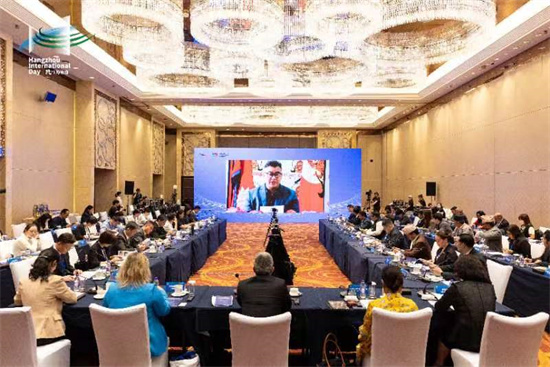
Maria Moreni, President of the Italy-China Link Association, emphasized the importance of addressing global issues through cooperation and maintaining an open-minded approach, recognizing that we all share one world. Wang Xiangsheng, Vice President of the Wuhan Municipal People's Association for Friendship with Foreign Countries, highlighted Wuhan's substantial contributions to the implementation of the Belt and Road Initiative. He noted that Wuhan has played a pivotal role in advancing economic and social development, enhancing the quality of life for nations along the Belt and Road route, and sowing the seeds of friendship. Wang pledged Wuhan's active support for Hangzhou in furthering its BRLC construction efforts.
In accordance with the BRLC's Constitution, the General Assembly and Council Meeting convened to review the adoption and amendments to the Constitution. They also deliberated on the selection of key individuals for roles such as the new President, Deputy President, Secretary-General, and Deputy Secretary-General. Additionally, they discussed the admission of new members into the UCLG ASPAC Committee, among other matters. During the meeting, it was announced that eight member cities and institutions had officially joined the BRLC, increasing the total membership count to 91. Representatives from these new members, including Managua City in Nicaragua, Zibo City in China, and Lianyungang City in China, were presented with their membership certificates. Hu Xiaohong, Deputy Mayor of Zibo, delivered a statement on behalf of the new members.
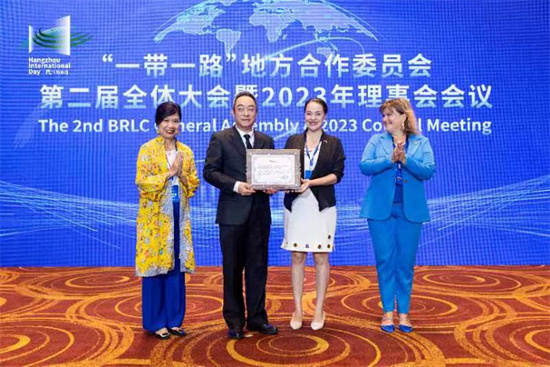
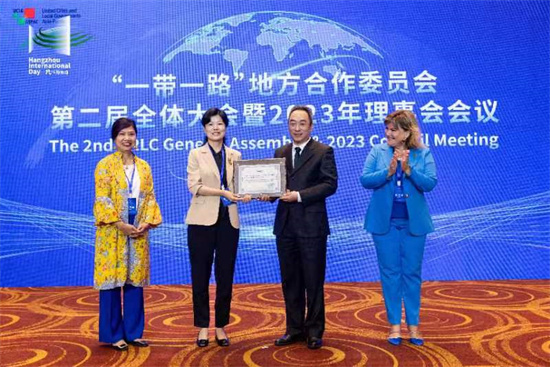
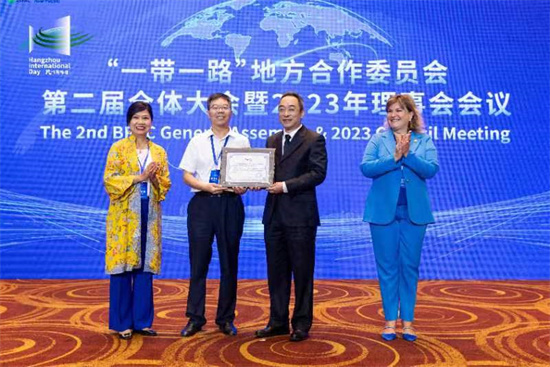
According to Dr.Bernadia Tjandradewi, Secretary-General of UCLG ASPAC, BRLC network has been steadily expanding, extending its membership distribution beyond the Asia-Pacific region, which is a noteworthy achievement. The significance of cooperation among regional governments lies in their collective endeavors to tackle challenges. It is imperative that we recognize our unique characteristics, capabilities, and strengths to develop core competencies. Over the past three years, the COVID-19 pandemic has posed a significant challenge. However, through our collaborative efforts, we have successfully overcome it. As the world continues to face various natural disasters and imbalances, it is essential to maintain an open and optimistic outlook, establish alliances, and devise suitable solutions in response to these challenges. Simultaneously, we should actively engage with and empower the younger generation, nurturing mutually beneficial relationships with young people, including university students.
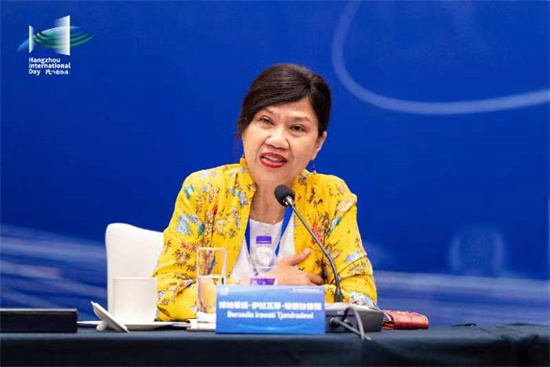


On the morning of September 5th, which was also the day of the 6th Hangzhou International Day, the 2nd General Assembly and the 2023 Council Meeting of UCLG ASPAC Committee on the Belt and Road Local Cooperation (BRLC) took place, via both online and offline, with the offline gathering in Hangzhou.
Ashok Kumar Byanju Shrestha, President of UCLG ASPAC (United Cities and Local Governments Asia-Pacific) and Mayor of Dhulikhel Municipality, Bernadia Irawati Tjandradewi, Secretary-General of UCLG ASPAC, Maria Moreni, Co-President of BRLC and President of Italy-China Link Association, as well as representatives from Wuhan City, Yiwu City (BRLC Council member city), and the Chairman of the Malaysia-China Friendship Association Sabah (BRLC Council member ), were in attendance. They all delivered speeches during the meeting. Additionally, approximately 80 representatives from member cities and institutions such as Xiamen, Changsha, Fuzhou, and Dujiangyan in China, Oulu City in Finland, Carpenedolo in Italy, Dhankuta in Nepal, the National Association of Rural Municipalities in Nepal (NARMIN), and the Municipal Association of Bangladesh attended the offline meeting in Hangzhou in person. Others participated in the general assembly online.

In his opening remarks, President Byanju of UCLG ASPAC expressed his delight at being able to convene in person once again after the challenges posed by the COVID-19 pandemic. He emphasized the importance of using this gathering to initiate new projects, promote mutual benefits and win-win outcomes, and foster broader partnerships.
During the meeting, BRLC Secretariat presented a report on the progress of work from 2018 to 2023 and introduced the upcoming five-year work plan. This year is significant as it marks the tenth anniversary of the Belt and Road Initiative and represents the beginning of a new phase for BRLC. BRLC’s goal is to establish itself as a prominent platform for regional cities to actively participate in the Belt and Road Initiative. Building on the support of UCLG ASPAC, the BRLC is committed to delivering valuable services to all its members, enhancing its operational model, strengthening its ability to promote the socio-economic development of member cities, and actively engaging more member cities in its initiatives. Secretary-General Jin Heng extended an invitation to all attendees to visit Hangzhou and discover the charms of the Asian Games host city, extending a warm welcome to guests from across the globe.

Maria Moreni, President of the Italy-China Link Association, emphasized the importance of addressing global issues through cooperation and maintaining an open-minded approach, recognizing that we all share one world. Wang Xiangsheng, Vice President of the Wuhan Municipal People's Association for Friendship with Foreign Countries, highlighted Wuhan's substantial contributions to the implementation of the Belt and Road Initiative. He noted that Wuhan has played a pivotal role in advancing economic and social development, enhancing the quality of life for nations along the Belt and Road route, and sowing the seeds of friendship. Wang pledged Wuhan's active support for Hangzhou in furthering its BRLC construction efforts.
In accordance with the BRLC's Constitution, the General Assembly and Council Meeting convened to review the adoption and amendments to the Constitution. They also deliberated on the selection of key individuals for roles such as the new President, Deputy President, Secretary-General, and Deputy Secretary-General. Additionally, they discussed the admission of new members into the UCLG ASPAC Committee, among other matters. During the meeting, it was announced that eight member cities and institutions had officially joined the BRLC, increasing the total membership count to 91. Representatives from these new members, including Managua City in Nicaragua, Zibo City in China, and Lianyungang City in China, were presented with their membership certificates. Hu Xiaohong, Deputy Mayor of Zibo, delivered a statement on behalf of the new members.



According to Dr.Bernadia Tjandradewi, Secretary-General of UCLG ASPAC, BRLC network has been steadily expanding, extending its membership distribution beyond the Asia-Pacific region, which is a noteworthy achievement. The significance of cooperation among regional governments lies in their collective endeavors to tackle challenges. It is imperative that we recognize our unique characteristics, capabilities, and strengths to develop core competencies. Over the past three years, the COVID-19 pandemic has posed a significant challenge. However, through our collaborative efforts, we have successfully overcome it. As the world continues to face various natural disasters and imbalances, it is essential to maintain an open and optimistic outlook, establish alliances, and devise suitable solutions in response to these challenges. Simultaneously, we should actively engage with and empower the younger generation, nurturing mutually beneficial relationships with young people, including university students.
